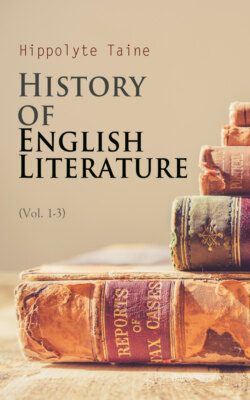Читать книгу History of English Literature (Vol. 1-3) - Taine Hippolyte - Страница 30
На сайте Литреса книга снята с продажи.
ОглавлениеCHAPTER THIRD
The New Tongue
Table of Contents
SECTION I.—The First Great Poet
Table of Contents
Amid so many barren endeavors, throughout the long impotence of Norman literature, which was content to copy, and of Saxon literature, which bore no fruit, a definite language was nevertheless formed, and there was room for a great writer. Geoffrey Chaucer appeared, a man of mark, inventive though a disciple, original though a translator, who by his genius, education, and life, was enabled to know and to depict a whole world, but above all to satisfy the chivalric world and the splendid courts which shone upon the heights.[193] He belonged to it, though learned and versed in all branches of scholastic knowledge; and he took such a share in it that his life from beginning to end was that of a man of the world, and a man of action. We find him by turns in King Edward's army, in the king's train, husband of a maid of honor to the queen, a pensioner, a placeholder, a member of Parliament, a knight, founder of a family which was hereafter to become allied to royalty. Moreover, he was in the king's council, brother-in-law of John of Gaunt, employed more than once in open embassies or secret missions at Florence, Genoa, Milan, Flanders, commissioner in France for the marriage of the Prince of Wales, high up and low down on the political ladder, disgraced, restored to place. This experience of business, travel, war, and the court, was not like a book-education. He was at the Court of Edward III, the most splendid in Europe, amidst tourneys, grand receptions, magnificent displays; he took part in the pomps of France and Milan; conversed with Petrarch, perhaps with Boccaccio and Froissart; was actor in, and spectator of, the finest and most tragical of dramas. In these few words, what ceremonies and cavalcades are implied! what processions in armor, what caparisoned horses, bedizened ladies! what display of gallant and lordly manners! what a varied and brilliant world, well suited to occupy the mind and eyes of a poet! Like Froissart, and better than he, Chaucer could depict the castles of the nobles, their conversations, their talk of love, and anything else that concerned them, and please them by his portraiture.
